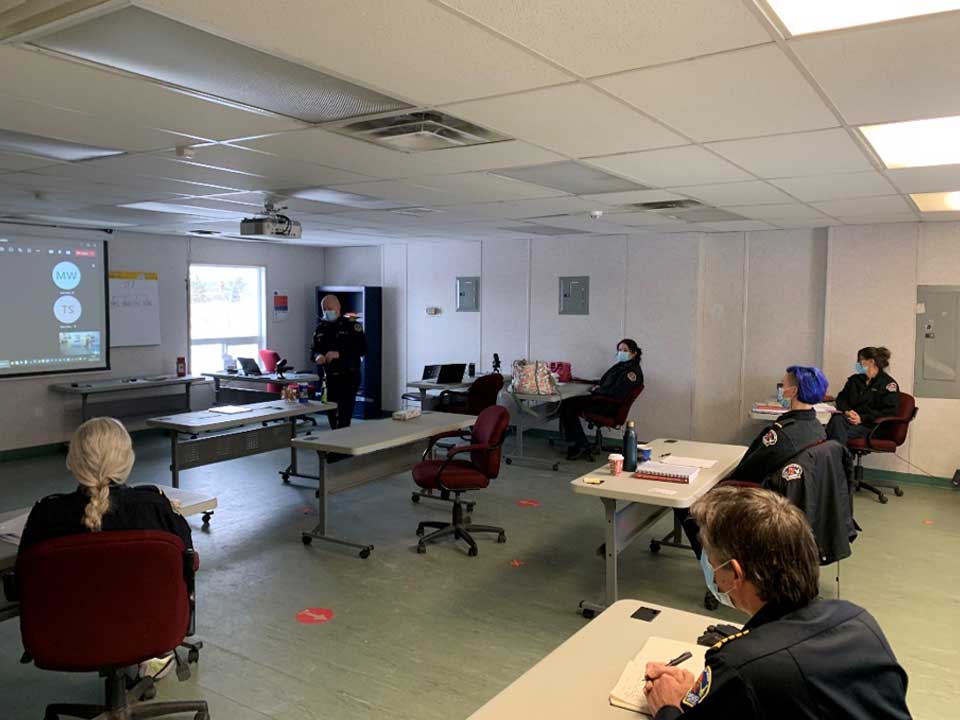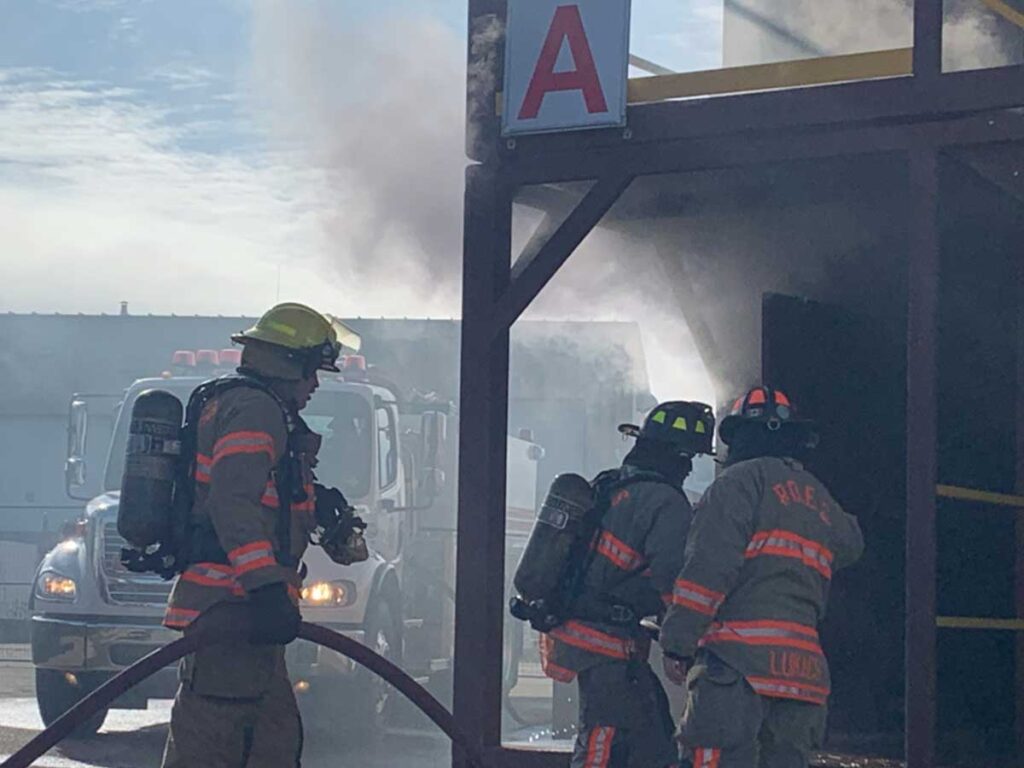
By Dave Bain
Photos by author
Being a fire instructor can be one of the most rewarding jobs in the fire service. It is immensely satisfying to pass down knowledge and skills to the next generation of firefighters. For those of us who are in a full-time role of training officer, our passion and dedication come with a price. To teach with passion and commitment requires an immense amount of mental and physical energy and focus.
- What the Best Fire Instructors Do
- Fire Instructor Development: Your First Classroom Session
- Fire Instructor 101
- YOU’RE THE NEW TRAINING OFFICER: NOW WHAT DO YOU DO?
Our students, whether they be the brand-new fire probie or the seasoned fire officer, ask us to be knowledgeable and effective both as instructors and firefighters. I believe that you cannot be an effective instructor without being an effective firefighter and, conversely, to be an effective firefighter, you should be able to teach your craft to others. Given that teaching and instructing are so difficult, why do we do it? I personally do it because I love the fire service, and I find it ennobling to build up and prepare my brothers and sisters the same way those who came before passed their knowledge on to me.
So how do you deal with a student who is challenging? It’s is easy to teach the dedicated and professional firefighter or fire officer who wants to become better and develop their members. One chief officer in my department, who was the former chief training officer before me, said it best: ”We do everything we can for those who can’t, but we will do the minimum for those who won’t.” What he meant by this was that we will put in all the extra work and dedication to help those who want to learn. Those who refuse to learn because of a lack of dedication and professionalism will not get the same effort.
However, what is the definition of a challenging student? I submit that it is not always the behavior problem or the “I don’t really care” guy/gal. A challenging student is any student who requires more effort and focus than your average student. This can be a positive or a negative, and each type requires a different approach.
The first thing to consider is how we can prevent a student from becoming challenging in the first place. As a fire instructor, start by doing the following every time you teach or instruct:
- Be prepared. Have developed lesson plans, course outlines, skill sheets, and presentations. If you are not prepared, you will lose interest and credibility very quickly.
- Set your classroom expectations for both students and instructors. This way, the student is aware of what to expect from instructors, and the students know what is expected of them. A training partnership agreement can be helpful to have posted in the classroom; have everyone initial it.
- Allow humor and fun if it benefits the learning environment, not take away from it.
- Remind yourself that you are there to teach a class, not a bunch of individuals. It is not fair to allow one or two students to monopolize your time and focus, leaving 15 or 16 others wanting.
Challenging students still present themselves and instructors should be aware of them and how to deal with them. There are many types of challenging students. Remember, not all are bad. The following are common ones you may have dealt with as an instructor.
The Know-It-All or Knows-More-Than-the-Instructor
This firefighter is usually a self-appointed expert and may or may not have the skill and experience to back it up. Adult learners are experiential learners and use their experience to help process learning new material (Merriam, 2007). These students usually have a lifetime of experiences. Those experiences may be helpful or may not be, but the know-it-all is usually yearning to be recognized for knowing more than the average new student. Sometimes, the know-it-all is just very enthusiastic, but sometimes they are a “grandstander” trying to shift focus from the instructor to themselves. You as the instructor will spend much of your time in dialogue with the know-it-all. If these people do not feel heard and recognized, they can become a wedge between you and the class.
To deal with the know-it-all, you must set boundaries and ground rules at the beginning of teaching (training partnership agreement). If it feeds the ego a little, it is possible to make the know-it-all your best friend in the class. You do this by acknowledging and validating the student on a small scale that you control. Using phrases like: “Ken, you have lots of experience in hazmat, what are your thoughts on dry decon?” This allows Ken to feel valued, and yet you retain control of the class and discussion. Ensure that the individual’s contributions are factual and correct for what you are teaching also.
If the know-it-all is becoming a distraction, you must be clear when it has gone too far. If you need to speak to the student in private to discuss, stop the class or, better yet, use a break. When you speak to the individual:
- Speak in private and out of earshot of other students.
- Be clear that the behavior is unhelpful and will not be tolerated.
- Give options, but the end result must be that they will stop.
- Follow through, always.

The Disengaged ‘l Don’t Want to Be Here’ Firefighter
People can be disengaged for several reasons. They can be shy or naturally introverted. Trying to force someone out of their shell can ruin learning. Adult learning must be “safe” insofar as individuals must feel comfortable to contribute, participate, and even fail. However, participation is usually a mandatory requirement of any training initiative. Once again, clear expectations at the beginning of the training will address this. The disengaged can just be bored and unmotivated. If they are being talkative and disruptive, deal with it early. You can also use their officers to manage them. Try dialogue with them to find out the root cause for them being disengaged. At the same time, clearly lay out your expectations. Ask them to stop, then tell them to stop, and identify what will happen if they do not stop.
The Class Clown: The Firefighter as Comedian
The class clown is not always a negative. Many times, especially during dry lecture content, the comic relief that a class clown can bring is a welcome tension reliever. When the class clown becomes a distraction and disruption to learning, however, it is a problem and must be addressed. If the class clown is not being disruptive, let it go. They are helping to relieve boredom.
If they are being disruptive:
- Start by redirecting the class back to the lesson.
- If it continues, have a one-on-one conversation at a break. Speak clearly about expectations.
- If it still continues, solicit help from officers. If it doesn’t stop, consider removing them from the class.
The Over-Engaged Student: Firefighter Helpy
These students are usually less experienced and are desperate to be involved. They are usually acting from a place of enthusiasm, and therefore we must be careful not to squash that enthusiasm. These over-engaged students usually have the best intentions and motivations. Start by trying to focus the student. Use them or call on them when no one else wants to participate. However, be careful not to allow them to over-monopolize the discussions or prevent others from asking questions or contributing.
The Truly Struggling Student
Remember our definition of a challenging student—any student requiring more of our energy and attention than the average student. All students learn in diverse ways and at different speeds. You may have a firefighter who is an extremely talented technical rescuer or paramedic, but give them basic hazmat principles and they struggle to understand. This does not make them dumb or disruptive—they just require extra time and focus.
When you have a student who is struggling, remember that you still need to teach the rest of the class. Some strategies to deal with the struggling student are:
- Discuss one on one with the student and look for specifics:
- Are you having a tough time with this?
- What specifically are you struggling with?
- What do you think you need?
- How can I help?
- Are there other factors at play? (Learning disability, home/life issues as distractors, etc.)
- Assign a second instructor to work with the student.
- Designate a strong student as the struggling student’s partner.
- Find time at lunch or before or after class to go over concepts and skills.
Remember, challenging students are a challenge, not necessarily a problem.
Managing the Classroom–LEAST
When dealing with classroom distractions, a helpful acronym is LEAST. It is laid out in order how to deal with the disruptive student:
L: Leave it alone. But monitor it to see if it gets worse.
E: Eye contact – Just like mom used to do with her death glare when we screwed up. Make eye contact and let students know you are watching them.
A: Address the issue, then and there, verbally.
S: Stop the class and discuss expectations, boundaries, and consequences with the student. Get the student to verbally acknowledge what you have laid out.
T: Terminate the student from the class
Always ensure you are properly and fully documenting the circumstance and events.
We are entrusted with teaching the fire service, and we can help guide great things. For those who cannot, we will do everything we can to make them successful. Those who will not or choose not to, however, must be managed.
References
Merriam, S. C. (2007). Learning in Adulthood, A comprehensive guide, 3rd edition. San Francisco, USA: Jossey-Bass.
Dave Bain has more than 28 years experience in the emergency services and is the chief training officer for the City of Red Deer Emergency Services in Red Deer, Alberta, Canada. He is a firefighter/advanced care paramedic. He teaches a wide variety of fire service and EMS topics, including company officer, EMS training, technical rescue, hazardous materials Response, and fire behavior. Dave is also a member of Canada Task Force 2, Canadian Heavy Urban Search Rescue/Provincial Disaster Response Team. He has a bachelor’s degree in adult education through the University of the Fraser Valley in British Columbia, Canada. Dave is the Region 4 director for the International Society of Fire Service Instructors (ISFSI).

